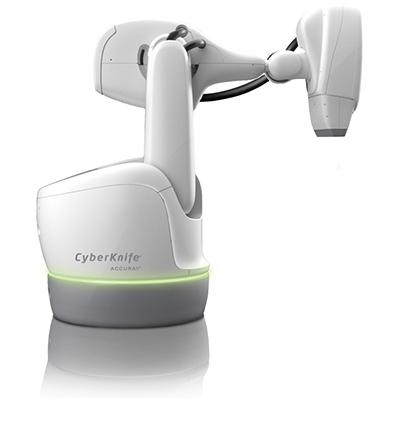Men at low risk of prostate cancer who got radiation therapy with Accuray‘s CyberKnife System were still disease-free after seven years, as were 88.5 percent of men at intermediate risk, concluded a clinical trial by the medical device manufacturer.
At seven years after treatment, disease-free survival rates were 100 percent for patients with low-risk of prostate cancer and 88.5 percent for intermediate-risk patients.
The study, “Five-Year Outcomes From a Prospective Multi-Institutional Trial of Heterogeneous Dosing Stereotactic Body Radiotherapy (SBRT) for Low- and Intermediate-Risk Prostate Cancer,” was presented at the Feb. 16-18 American Society of Clinical Oncology Genitourinary Cancers Symposium (ASCO GU), held Feb. 16-18 in Orlando, Florida.
The CyberKnife is a non-invasive, frameless radiosurgical device that delivers stereotactic body radiation therapy (SBRT) throughout the body with very high precision. It also helps doctors track and correct, in real-time, delivery of radiation to the prostate.
The Phase 2 study (NCT02225262) enrolled 259 prostate cancer patients, 112 of whom were low risk 147 intermediate risk. Doctors, using CyberKnife, treated the men over four days with 38 Gy radiation fractions. The study aimed to assess disease-free survival and measure the incidence of acute and late genitourinary and gastrointestinal side effects after the treatment. Researchers also compared results obtained with the CyberKnife System with those of standard methods.
The study showed that after treatment with the CyberKnife System, five-year median PSA levels (a biomarker of prostate cancer) were 0.1 ng/mL, falling to 0.035 ng/mL at seven years after treatment. Usually, doctors suspect prostate cancer recurrence when PSA levels rise above 4.0 ng/mL.
“Outcomes from this long-term, prospective study reinforce that CyberKnife prostate SBRT is highly effective, with typically minimal side effects and impact on quality of life during and after treatment,” Donald Fuller, MD, the study’s lead researcher, said in a news release. “Nearly 90 percent of patients in the study were treated at community facilities across the United States, which may provide reassurance for men with localized prostate cancer that the results are achievable in their community setting.”
The CyberKnife System had already shown promising results in another study, presented last year at the American Society for Radiation Oncology (ASTRO) 58th Annual Meeting and the Best of ASTRO meeting. That study showed that five treatments with the CyberKnife System provided excellent disease control for patients with prostate cancer.
“This is the second large, prospective, multi-institutional study to bring clinical evidence of the benefits of CyberKnife SBRT for the treatment of patients with low- to intermediate-risk prostate cancer,” said Fabienne Hirigoyenberry-Lanson, PhD, Accuray’s vice president of global clinical development. “No other radiation therapy device for prostate SBRT is supported by such a robust clinical database.”

